Like many, I aspire to move totally off-grid.
I’m just not comfortable with the condition the world is in today and the dependency we all have on the grid. On top of that instability, I want the freedom that being off-grid offers me, especially financial freedom. Living off-grid would reduce my monthly cost of living, something I need to consider before reaching retirement age. But more than anything, I just want to prove that I can do it.
I’ve been working towards this aim for a number of years and I’ve made a lot of mistakes along the way. Most of those were due to simple lack of understanding on my part; the same reason why many others have made mistakes. But now that I’m moving, forcing myself to start over again (as crazy as that may seem), I need to make sure I don’t make the same mistakes.
Actually, I’ve since learned that many of these mistakes are common. In a way, that makes me feel better, as I’m not the only one. But at the same time, I sure wish someone else had warned me about these mistakes, saving me the trouble.
There’s more than one way of talking about going off-grid.
Most commonly, this refers to off-grid power, producing your own electricity. But off-grid living can include much more than that; at its fullest extent, off-grid living means full self-sufficiency and sustainability. You’ll have to decide for yourself how much you want to do to reach that goal.
Multiple Power Sources
When we talk off-grid power, that usually means solar and wind power. While there are some other means of generating electricity, like hydroelectric, most of us are limited to those two options. In some parts of the country, we might be limited to only one of them, either due to lack of wind or lack of sun.
Ideally, an off-grid power system will include both wind and solar power. That way, you’ll still have some electrical power consumption, even if one isn’t producing anything. Where I live, the wind tends to be stronger at night, which is great, as my solar panels don’t produce any power during those hours. The only reason I’m not using hydro-power too, is that I don’t have a river available.
Do it Yourself and Save Money
Let’s face it, solar and wind power are expensive. When I got a bid from a contractor to put solar power on my house, it was over $60,000. A good wind turbine can run $10,000 or more. These aren’t cheap technologies. However, you can save yourself a bundle, if you make it yourself.
You can make your own solar panels for roughly half of what you can buy them for, and it’s really not all that hard to do. However, the work is very tedious and you have to be careful, because solar cells break very easily. Likewise, you can make a pretty decent wind turbine for a very reasonable price; for that matter, you can make several of them, for what you’d pay to buy one commercially manufactured one.
The other advantage of doing it yourself is that you’ll understand the system. That way, when you need to make repairs, which will happen eventually, you’ll know how to do them. Should there ever be a breakdown of the power grid and you need to live off the power you produce, that knowledge will be invaluable.
Reduce Your Power Consumption
Off-grid power is expensive; there’s no two ways about it. Even doing it yourself, you’re going to spend a lot of money. So there’s no reason to make things harder for yourself. Put another way, there’s no reason to make it necessary to produce any more power than you have to. Each watt of power you can save, reduces how much you have to spend money so that you can generate.
There are lots of things you can do to reduce your power consumption, especially today, where there are so many energy-efficient alternatives. Start by switching all your lights over to LED, then see what else you can do.
Another way of saving electrical power is to switch over to 12 volt devices, rather than using 120 volt ones. The power your off-grid system is going to produce is 12 volts DC. If you have a refrigerator which will run off of that, rather than normal 120 volt AC house current, that’s less power you have to run through an inverter, with the corresponding loss due to the inefficiency of the inverter.
Of course, you want to also make sure that you aren’t just wasting power, doing things like running lights when you don’t need them or leaving your television on when nobody is watching it. Remember, every watt counts.
Don’t Underestimate
Solar power companies aren’t really your friend, when it comes to figuring out how much power you need to produce.
They are hoping to sell you a system which will produce the average power you use, with the idea that you will sell power to the electric company when you are producing too much and buy it from them when you need more.
But if you’re going off-grid, doesn’t that indicate that you won’t be buying and selling power? You actually need to be able to produce power at your peak usage level, not something less. Yes, you’ll be storing some power in your battery backup system, but that won’t be more than a day’s worth.
One thing you have to watch out for here is the conversions from 12 volt DC to 120 volt AC. When you change the voltage, you inversely change the Amperage/Current. So, if you need 1000 watts of 120 volt AC power, you have to pull 1000 watts of 12 volt DC power from your battery bank this would be approximately 100 Amps. Actually, it will be a little more than that, because the inverter doesn’t work at 100% efficiency.
Get Your Angles Right
A solar power contractor will mount your solar panels flat on your roof, whatever your roof angle is. That’s a big mistake. To get the most out of your solar panels, you need to set the angle they are mounted at to match the sun’s track in the sky. This is calculated based upon the latitude you live at.
To make things a bit more complicated, the sun’s track changes throughout the year. That’s why we have four seasons. So, if you want to get the maximum efficiency, you need to be able to change the angle your panels are by about 20 degrees every season. That mean mounting them in a way that making those changes is relatively easy.
Please note that if you are not the person who is going to make those changes every quarter, then set the solar panels at the right angle for spring and fall. That will give you the best efficiency on an year-round basis, while saving you that extra work.
More Battery Backup
Just about everyone I’ve ever seen blows it on the battery backup. Ideally, you need enough battery capacity to account for two full days of your peak electrical usage. If you can’t do that, then you want at least a day’s worth. That’s a lot of batteries, when you stop to figure it out, especially when you have to boost the 12 volt battery power to 120 volts for your home’s appliances.
Spare Parts
It’s well worth the investment to have a few critical spare parts around. Specifically, you need to have bearings, brushes and electrical contacts for your wind turbine. You also need a spare solar charge controller and voltage inverter for your solar power system. The panels aren’t likely to go bad, even in an EMP; but the charge controller can.
A Huge Water Cistern
Regardless of how you are getting your water, whether through a well or rainwater capture, you want to have a huge storage capacity, at least a couple thousands of gallons. That way, you’ve got water, even if your off-grid power fails or you hit a dry spell. If you’re pumping water out of a well, then set your pump on a timer, so that it fills your cistern during times when you’re drawing less electricity or producing more electricity than you need.
One of the easiest and cheapest ways of coming up with a cistern is to buy an above-ground swimming pool. If you put a cover over it, that will be enough to keep leaves and dirt out. Treating the water, as if it were being used as a swimming pool will keep it safe to drink.
That Garden’s Not Big Enough
I don’t care how big your vegetable garden is; chances are, it’s not big enough. I’m sure you’ve seen articles about people who raise all their own food, sometime. Those people covert their entire backyard into a vegetable garden; they don’t just have a small one. I had a neighbor like that once and he not only used his whole backyard, but half of mine as well.
It takes about a ton of food per year to feed one adult. So you’re going to need to up your ante on your gardening, if you’re planning on going off-grid with your food. The hardest part is growing grains, which also happen to take the most space.
Of course, if you’re going to raise any sorts of animals, you’ll want to raise their feed for them too. Otherwise, how will you feed them, if there’s a breakdown in society?
Don’t do it All Today
One thing that will drive you nuts, if you let it, is the pressure to try and do everything at once. Of course, this is the same problem that any prepper has. Once you start along the road towards going off-grid, you’re going to feel like you’re going too slow and want to do it all.
The reality is that you can’t do everything at once. It requires too much time and too much money. Besides, you’re going to have to learn how to do many of the things you want to do and that’s going to take time as well. So, spread it out. Work on learning one thing at a time, so that you don’t overload yourself. Once you become proficient with that new thing, then you can add something else.
Going off-grid isn’t so much a destination, as a journey. There will always be something else that you’ll think of adding to your off-grid lifestyle, whether it is smoking your own meat or keeping bees. Relax and enjoy the journey.
Don’t Cut Yourself Off
Finally, don’t be in a hurry to pull the plug and cut yourself off from society.
Rather than that, look at the infrastructure you’re trying to break away from as your safety net. There is no requirement to disconnect the power meter from your house, nor is there a requirement to use any minimum amount of electricity in any given month. Keep it hooked up and just don’t use it. That way, if something goes wrong with your system, you’ve got something to fall back on.
This is true of all your systems, not just the electric grid. When I put in a well, I kept my hookup to the city’s water system. While I didn’t use it, I had that capability, if something went wrong with my well. Likewise, when the city put in sewer lines, I kept my septic system intact, with a diverter so that I could use them, if the city system ever went down.
They didn’t want to let me do that, so I did it after they had finished their work; the city doesn’t know about it. Oh well, what they don’t know, won’t hurt them.
There’s another good reason to keep yourself connected; that’s because more and more municipalities are passing laws against going off-grid. That sounds like crony capitalism to me, with the utilities paying the politicians to make sure they have a customer base. But regardless of the reason, they can’t complain that I’m not using enough water and electricity, as long as I’m still hooked up to their system.


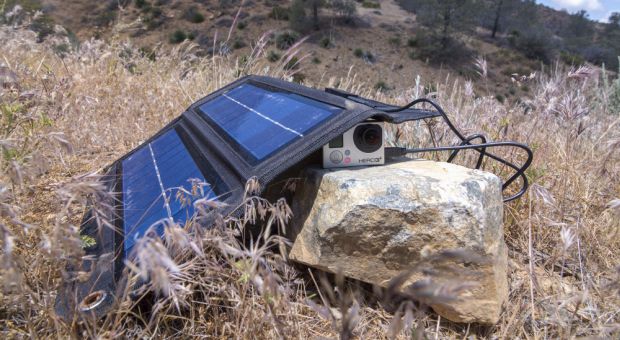

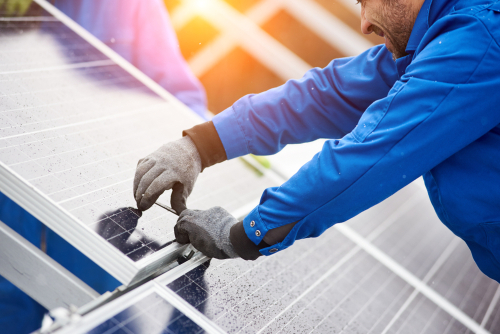


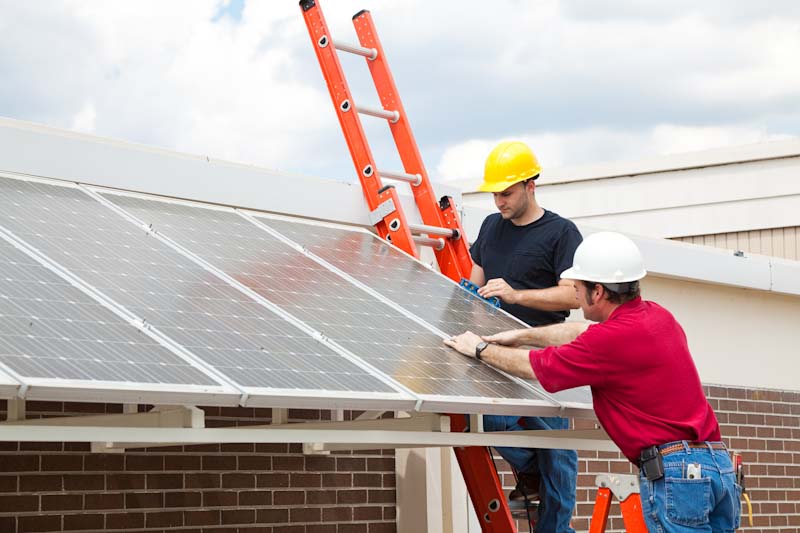
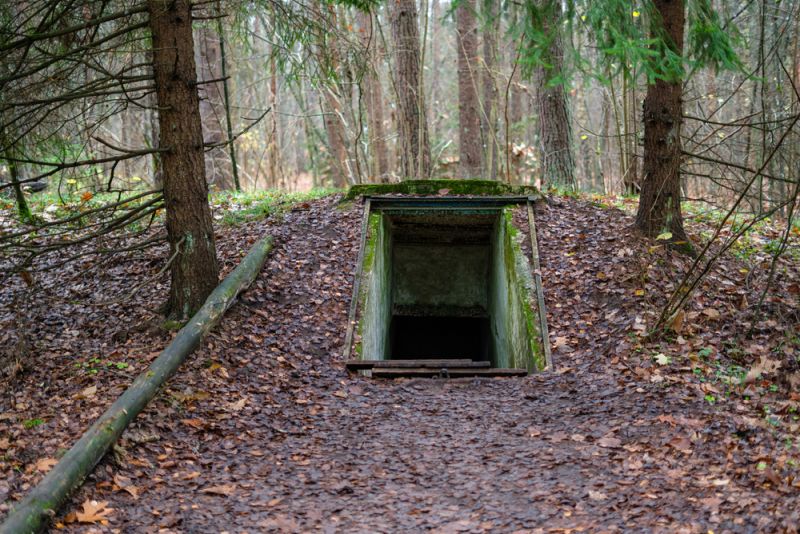
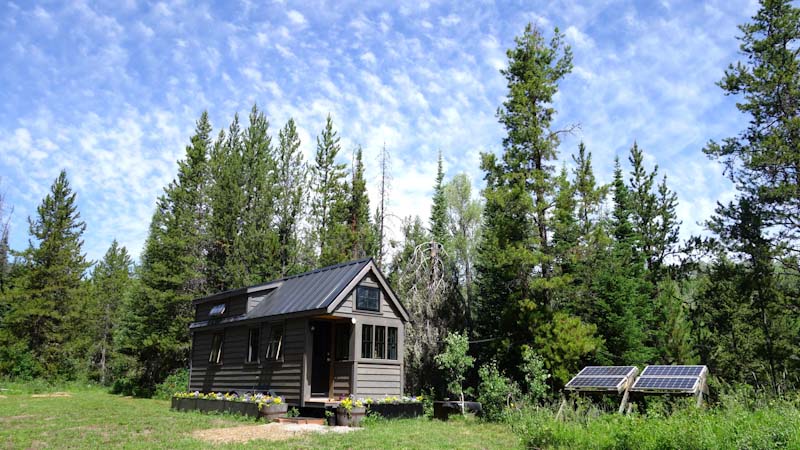


Erich | January 22, 2019
|
When you talk about Watts (P), Volts (V) and Amps (I) you should at least know Ohm’s law which implies: P = V * I
120W is 120W no matter the voltage. At 120V it’s 1 Amp. That’s what’s inversely proportional to the voltage. The battery will have to supply about 12 Amps in this case – if you add 2 Amps for the losses in the inverter.
About the best angle for mounting the solar panels if theyr are fixed: they should face the sun in early and late summer.
Beause in summer the panel temperature is higher which makes the panels less efficient, so they need more light to compoensate.
Sam | February 19, 2019
|
You are correct. However, Bill said the same thing in plain English. There is not an appliance in your house that tells you how much current it draws. Only what it’s power (wattage) requirements are. And Spring and Fall works for me.
Bill in Idaho | January 22, 2019
|
An Excellent Article, Bill ! Covers All of the Basics in brief form. For me, Wind Power is the Real Deal. I have to laugh out loud, whenever anyone discusses solar power – roof photo-voltaic cells – $ 1000 might just get you started; and the sun angle changes hourly; and the performance at 0300 is None. I am looking out the window just now – It’s Jan 22, the sun is just up at 0915, struggling through a hazy atmosphere 10 times as thick as an overhead sun. Sun gets up to 15 Degrees elevation at 1300 and still hazy. Solar cells are useful (maybe) from June 22 through August 15 when we have about 16 hours of sunup. No – the real issue is storage cells – batteries – and that is 80 % of your challenge. Used golf cart batteries are the way to go. My 12 foot Dia. windmill gives me about 500 – 750 watts with a decent wind – which we have a lot of on the Snake River rimrock.
Sam | February 19, 2019
|
We don’t all live in Idaho, Bill. But your point is well taken. Where I am, I could export sunshine. But even here, there is none at 0300. The thing is to never put all your eggs in one basket. You are spot on about the batteries. You are going to spend more on them and your necessaries than your wind mill cost. But that is true about any system.
Ed Schrade | January 22, 2019
|
What I like about a solar system is that you can start small and gradually add to it. You can even add a wind turbine to it to help the solar system compensate for hazy or cloudy days but are windy.
Miskwa | January 23, 2019
|
Will be going to my farm in Michigan’s UP come Spring. Colorado is not a good place to be according to climate change predictions. It looks like the Western base of the Keweenaw is suitable for neither solar nor wind. One of the houses has an electric water pump; that, and a small chest freezer, washer, some lights would be most of my electric usage. No fridge, TV, microwaves or other impedimentia of the modern world. Back house is off grid with a hand pump and sauna for bathing. I will be homesteading alone with my first priority to get the gardens going again. Glad to see sites like this. The county disallows off grid, off the system living but it’s hard to enforce except with new construction and this place is going on 100. Have been prioritizing tasks according to timing in the season and whether or not house in Colo sells. I’m 58, but a fairly strong and skilled 58, even for a smallish female. Any suggestions would be welcomed.
Bill in Idaho | January 23, 2019
|
Hello, Miskwa. You are thinking Smart and appear Well Organized. Review your Priorities every month or two – they May change. Gardens are definitely a place for your main focus and energy expenditure. I have a Lot of reference material on gardening and Horticulture in general. Let me know your E-Mail if you are interested. I will send you some samples. You can contact me at wmarrs at bcmvco dot com.
Cpt M Garnett Ret. | January 24, 2019
|
Hi
I live part time in luce co, use solar and a gen set in winter for back up. Wife has dish network /water / hot water /toilet etc. Wood and propane heat. WE use about 30 bucks worth of gas in winter months for power. Have buried pre-pressure water tanks we fill every 3-4 days. so the submersible pump only runs about 15 minutes to fill up buried tank for 3-4 days use. We use AGM batteries and a 3000watt inverter. Need no gen set at all, all summer,,march, thru nov. Wish you well
Lisa | January 23, 2019
|
Miskwa, you’re never too old. Old? I’ll admit to 10 years above you. The big thing is I pass for your age. Youngers can’t believe I do so much. My place is two acres, 800 ft above a large city. This community is all septic, the solar is in, but will be adding to it. My excuse to the man is I’m adding out buildings. I’m trying to only spend on infrastructure. Have the animals ok, but no experience with gardening. We have two planting seasons so hope the learning curve is faster.
TheSouthernNationalist | January 23, 2019
|
If you dont feel like fighting a tiller plow then I would sugggest building 8×12 box gardens from untreated 2×12 boards. You can build them as high as you need so you wont have to bend over as much, easy on the back and easy to keep weeds out.
TheSouthernNationalist | January 23, 2019
|
I like that idea of being hooked up to the city/county utilities but not using them, many places have passed laws about not being hooked up to the grid. Being hooked into their system, they cant charge you for a crime, and so the joke is on them! Good job!
Sam | February 19, 2019
|
Great idea, if you can make it work. If you are hooked up, PEC will charge you $35 for the infrastructure. We are working on the usage reduction part, so we can see how much we will have to spend. We pay about $85 now, and half of that is fees and taxes. But I’m not trying to stick it to the man, just getting ready for when I am the stickee.
STEVEN A WHALLEY | January 15, 2021
|
“But half that is fees and taxes.” Sorry to tell ya Sam, you (we) are already the stickee! Peace
IvyMike | January 23, 2019
|
A cheap and easy raised bed is T posts driven into the ground on 4 foot centers in the shape you want, at the height you want. Then attach chicken wire to them just like you’re making a fence, then line the chicken wire on the inside with weed barrier fabric. The one I made is 8 years old, a bit ugly, and still growing peppers.
Hclo | January 24, 2019
|
Simple schematics would be very useful re wind generators etc.
As in use old car parts
Crystal | January 28, 2019
|
Just a note on being required by the city to use the utilities. A couple years ago I was living in my privately owned home in Denton, Maryland, (good ‘ole boy Caroline County Maryland). My husband was very ill and I was having to take him to Baltimore, an hour and a half away, to hospitals and doctors. Long story short, the loss of his income and reduction in mine caused everything to fall behind and my electricity was shut off. While in Baltimore trying to get my husband to his appointment, which ended up turning into an EMT call by the doctor’s office, I get a call from the Denton town manager telling me I was not allowed to return to MY home because the town had been informed that the electricity had been turned off. I tried to explain the situation and what I was in the middle of at the moment and he just became extremely rude and indignant and informed me that I would be arrested if I attempted to live in my home for even a single night! I did research on the legality of this and apparently it is not uncommon. I do not understand how a town can do this and I believe something needs to be done to prevent this happening to anyone else.
Clergylady | February 10, 2019
|
I have solar and love it. Adding more batteries. One of my wells and an out building still use company power. I have more panels, controllers and a couple of larger invertersready to use in a workshop one day. I have a 12v well pump and will soon add one to a large water container all on my second well.I also have a manual winch to draw a well bucket for that second well.
I have several garden areas. Some raised bed and some that will be ancient style squares to hold desert water and protect crops from drying winds. There are swales being started with brush and dirt berms to hold moisture and feed crops as they decompose. I also have a small dug out pit for composting. Aged chicken manure for crop production. Fresh rabbit droppings for quick green growth. Alfalfa, amaranth, and grass fodder make all my critters happy. I also consume alfalfa sprouts and growing tips and amaranth leaves and seeds. lambs quarters leaves raw and cooked are good as are sprouted seeds. A green house will be a necessity but hot beds are already used for starting seeds. We’ve added wild fruits and roses and cacti for food and cacti along a fence line for some security.
It’s strange how living on the edge of an over reaching set of law makes life hard for some. I live a quiet law abiding life but it’s frustrating. All I want is to live with less spending and we can’t go fully off grid solar or wind power without creating trouble. We need new laws!
Sam | February 19, 2019
|
No, Ma’am, we have too many laws. We need to get rid of quite a few of them. And those who wrote them. Especially if they were never elected.
Sam | September 5, 2019
|
Sam, you make me proud!
Sis | September 6, 2019
|
We live off grid. We use a Harris wheel micro hydro system with batteries and inverter, with a small solar panel array. Propane hot water tank with an adjunct electric water heater which handles our power output in the summer months. We have hardwired in a Sunfost refrigerator. We have an electric washer, propane dryer, and use use clothes line in the dry season. Wood stove for heat. Yes it was a steep learning curve. We learned to have replacement parts on hand for the various systems as well as setting funds aside for replacing batteries and a strict maintenance schedule. We cut our wood in spring and summer and use seasoned wood in our stove. We also have done a lot of brushing and clearance work fir wild land fires and have a source of water for roof top and under eave sprinklers as well as fire extinguishers on hand. Our biggest issue was dealing with vermin eating hose lines in vehicles and our tractor, log splitter and roto tiller. As well as bears loving to chew up our water lines, gas cans and the tractor seat,
Ivan Bauer | February 15, 2020
|
We bought 20 acres, the land cost less without access to the grid. Have developed and built using ground solar panels that can easily be adjusted seasonally. The solar 48V system was built 5 years ago, using 8 in series acid lead batteries. We are now switching to 2 48v Lithium batteries. The capacity can be drained from 100% down to 20% without harming the 10,000 cycle life. There is no maintenance or venting required. For wood heating/fuel we use electric wood splitter and electric battery chain saw. We use a large electric refrigerator May thru October then switch to smaller refrigerator with propane/electric option. Have a blaze King wood stove that has a metal thermostat. We have a on demand water heater using propane with no electric plug. We have a separate solar water pump system to move water from a spring to a reservoir up on a hill above house to have gravity water to house. This water pump will run slowly even when cloudy. Am currently building a large passive solar greenhouse to extend our NE Washington growing season. There are many things that can be done to be off the grid.
Nelson | February 15, 2020
|
Spray all wires under hood of vehicles with Wd40. Vermin will not chew wires.
STEVEN A WHALLEY | January 15, 2021
|
THANK YOU! IN THE MOUNTAINS HERE CRITTERS LIKE ANY PLACE WARM AND CAUSE HAVOCK!
S T | February 17, 2020
|
Problem I have is the wife absolutely INSISTS on incandescent lighting. Says CFLs and LEDs flicker and give her headaches and she can’t see well with them. Frankly I think much of that is entirely psychological, not that she’s all that sane to begin with. I must admit I myself have mostly vacuum tube ham radio gear so it won’t get toasted by an EMP. If I were to go off grid i would hope to get a whole lot of those huge Edison (nickel-iron) batteries like the telephone companies have (or used to) at their central offices. Just wish I knew where to get some.
Toby | January 10, 2021
|
The Chinese are making the Edison battery. Look at a Vanadium reflow battery, high power density, and LONG life like the edison. It cam be charged at 12 volts, and run a system voltage of 24 or 48 volts for the more modern systems. I am looking at making my own Edison cells.
‘
The flicker on the LEDs is the power source, not the device. Running on battery, it won’t flicker. You can get an RGB LED and ‘tune’ the light frequency to whatever she likes. I intend to run my entire light system with LEDs at the new homestead, directly from the main battery.
I am a ham too, and have gear stored in Faraday cages for just in case. Some that is out is tube type, and I have been collewcting tubes for years…just in case!
Theresa | January 10, 2021
|
What is the best way to winch water from my well 75 feet deep. There is currently a well pump in it.
STEVEN A WHALLEY | January 15, 2021
|
THERESA, First thing that comes to mind is a siphon system, BUT that can only be used if you are in an area that you can get far enough down hilll to make it work.
Scott Todd | January 15, 2021
|
Get yourself an old fashioned farm type windmill.